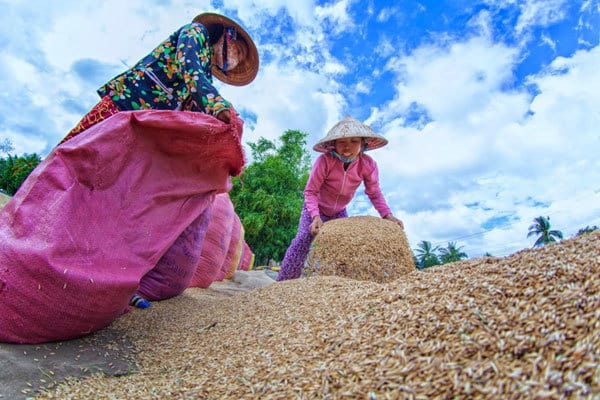
Rice husk is a coating on rice grains that protects the seed during the growing season and this agricultural by-product is one of the largest biomass resources in Vietnam.
In 2019, the country harvested 43.8 million tonnes of rice, which generated approximately 8.8 tonnes of rice husks. According to the Ministry of Agriculture and Rural Development’s plan, the husks will increase to 9.21 tonnes by 2025.
In the past, deemed as a kind of waste, rice husks were dumped into rivers or burned in fields, wasting a remarkable source of energy while badly affecting the environment.
The value of rice husks is being recognised nowadays. In some areas, people have increased the life cycle of rice husks by using them in livestock or as fuel, but these methods have only been applied on a small scale and have not significantly enhanced the added value of rice husks.
Since 2019, the German Development Cooperation Agency (GIZ) in tandem with the Ministry of Industry and Trade has implemented a bioenergy project to promote the sustainable use of rice husks and other biomass resources for electricity and heat production throughout Vietnam.
The Climate Protection through Sustainable Bioenergy Markets in Vietnam (BEM) project focuses on three action areas: 1) supporting the adjustment of a legal and regulatory framework, 2) capacity development for private sector and other relevant partners as well as financial institutions, and 3) technology co-operation and networking between Vietnamese and international businesses and universities.
The BEM project is funded by the German Federal Ministry for the Environment, Nature Conservation and Nuclear Safety through the International Climate Initiative (IKI). It is part of the GIZ Energy Support Programme (ESP), which consists of a number of projects on renewable energy and energy efficiency.
“With its developing agricultural economy, Vietnam has tremendous potential for utilising bioenergy resources such as sugar cane residue (called bagasse), rice husk and rice straw, or other agricultural and woody residues,” said Nathan Moore, director of the BEM project. “With the project, GIZ will support the country’s efforts in sustainable energy transition and energy diversity.”
Recently, GIZ’s BEM project has made strides to accelerate the use of rice husks as an alternative to fossil energy sources and increase the value chain of the agricultural by-product by processing its ash into silica.
The BEM project signed an agreement with Sanofi Vietnam on September 23 to support the company in implementing its “Rice is the New Green” (RING) project. GIZ will evaluate RING’s technical and economic feasibility, including the project’s potential size and cost, energy cost savings, and business models with an aim to help the enterprise power its boilers with rice-husk energy instead of diesel, and promote the value of rice husk.

“Implementing the RING project with the BEM project of GIZ will definitely be an innovative and determined step for Sanofi Vietnam on the journey to become a pioneer in the pharma industry in transforming and using renewable resources in the country, as well as its further ambition to be an ambassador to promote and replicate the rice husk biomass evolution to other enterprises to take advantage of this plentiful green energy in Vietnam, heading to a carbon-free emission future across the country,” said Eric Auschitzky, CEO of Sanofi Vietnam’s Manufacturing Division.
With the RING project, Sanofi Vietnam aims to reduce CO2 emissions by about 2,000-3,000 tonnes of CO2 per year and entirely use rice husk biomass energy in production. The BEM project of GIZ will provide technical support to Sanofi Vietnam in its transition and help Sanofi promote this development model as a typical project of the sustainable bioenergy industry in Vietnam.
“RING presents an exciting new opportunity to extend the application of biomass as an alternative to fossil fuels for heat production into new sectors in Vietnam, increasing the value chain of rice husk products, and contributing to circular economy model,” said Moore.
“Based upon our deep experience in the global bioenergy sector and our long-term support of key stakeholders in the country, GIZ looks forward to the RING project further demonstrating how bioenergy projects in many commercial sectors can contribute to Vietnam’s energy and environmental objectives,” he added.
Since its implementation, GIZ’s BEM project has supported many enterprises in Vietnam in converting their fossil-fuelled boilers to biomass-fired ones. The move will benefit a variety of aspects such as socio-economic development, climate adaptation, and energy security, contributing to the nation’s green development, increasing production surplus, and complying with the Paris Climate Agreement (COP 21) on regulations to reduce greenhouse gas emissions by 8-25 per cent by 2030.
(VIR)




